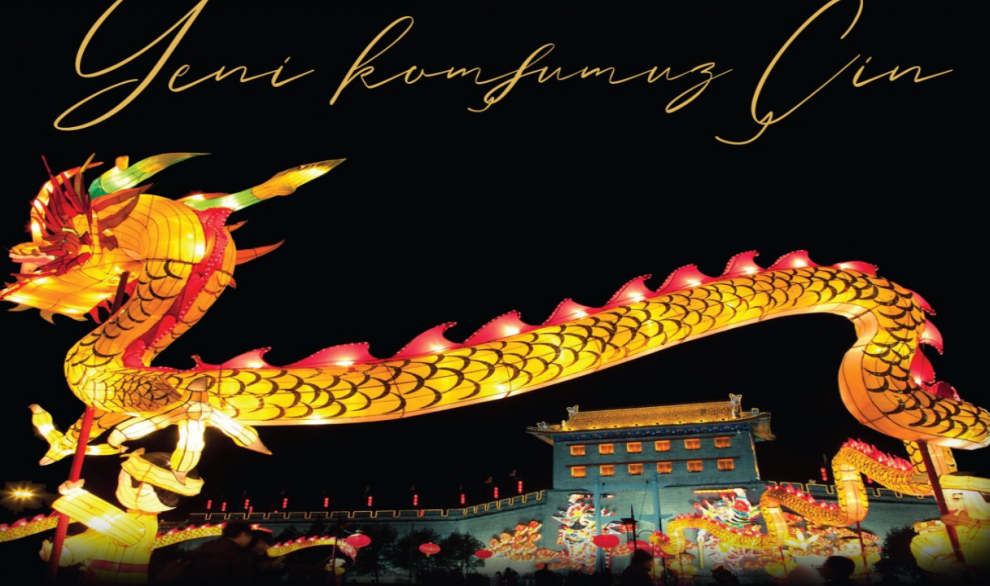by Nurettin Akçay
Global balances are changing and China is gradually increasing its influence in every corner of the world. What does this new power growing in the Middle East mean for Turkey? Is Turkey ready to face the reality of China, which is no longer just a distant Asian country, but almost next door?
The Middle East has always been one of the top priorities for Turkish foreign policy. Due to its energy resources, the threats it poses to Turkey’s national security and the geography in which it is located, the region has been one of the main focal points of Turkish foreign policy for years. In addition to the Middle East, the United States, which has the power to penetrate every inch of the region as a hegemonic state, is also at the top of the list. This is because the main driver of most non-state actors in the region has always been the United States. For this reason, for years, along with the actors in the Middle East, it has been tried to understand what the American elites think about the events in the region. Because everyone knew that it was not possible to take any action in the region without Washington’s involvement.
In recent years, a new actor has entered the equation, and his name is becoming more and more popular every day. The name of this new actor is China, a name that everyone has been talking about for a long time.
As a result of decades of steady economic growth, China has become the world’s second largest economy with a GDP of 18 trillion dollars. In purchasing power parity terms, it is the world’s largest economy. Accounting for 18% of the global economy on its own, China is now the world’s largest manufacturer, largest exporter and second largest importer. According to the projections of many research organizations, it will overtake the US as the world’s largest economy in 2030.
From Latin America to Africa, from Central Asia to Southeast Asia, from the Middle East to Western Europe, there is almost no area that China has not penetrated thanks to its economic power.
Although it is a relatively new player in the Middle East, it is increasing its footprint in the region every day. China’s economic presence in the region has reached unbelievable proportions, with new agreements with countries in the region almost every day. In fact, China has become one of the top five importers of every country in the region without exception. China’s trade with Arab countries has reached a huge volume of 430 billion dollars in 2022. Chinese products can be found in every city and even every village in the region. Moreover, China is not only selling goods to Middle Eastern countries, but also bringing its direct investments to them. Many countries in the region have joined the Belt and Road Initiative, one of Beijing’s biggest challenges in recent times. With this project acting as a catalyst, Beijing has invested heavily in the region in recent years, particularly in energy. Between 2005 and 2021, China has invested 43.47 billion dollars in Saudi Arabia, 36.16 billion dollars in the UAE, 30.05 billion dollars in Iraq and 25.78 billion dollars in Egypt.
At first glance, it seems as if China has only an economic presence in the region. This is the narrative the Chinese are presenting to the world. They have repeatedly stated that they want to develop an economic relationship with the Middle East on a win-win basis, that they are not interested in the internal affairs of any country and that they want to stay away from the problematic areas of the region. However, it would be too optimistic to think that China has no political expectations. China knows that for the continuity and stability of its investments, it needs political powers that can work in harmony with it, or at least not be hostile to it. Moreover, China’s commercial activities in different regions should not be evaluated purely from an economic perspective, with a win-win approach. China knows very well that where its economic influence grows, its political influence will also grow. For example, when we look at the outcomes of the last China-Africa cooperation forum, we can see that the parties can also agree on items that have a certain political purpose, such as inviting African political leaders to Beijing, establishing research centers in Africa, and sending Chinese experts to Africa.
Turning to the Middle East, while the question of why China attaches importance to the region comes to the fore, there are 5 important reasons behind China’s motivation for the region.
1-The region’s rich energy resources
2-The Middle East is an important market for Chinese goods
3- It is one of the routes of the Belt and Road
4- It contains Muslim countries whose support should be sought in the Uyghur issue
5-It offers an important diplomatic experience field for China thanks to its dense problem areasFor all these reasons, the Middle East is one of the regions of vital importance for China. On the other hand, as a result of the US gradually reducing its presence in the region, China has started to intensively increase its footprint in the region in recent years. When we look at what is being done, we witness important initiatives that are also closely related to Turkey.
For example, it is bringing Iran and Saudi Arabia, two adversarial states in our near geography, side by side. This diplomatic success is also important in terms of showing that China has started to take political initiative in the region beyond its economic activities. As you may recall, thanks to China’s mediation, Iran and Saudi Arabia agreed to mend their troubled relations and reopen diplomatic missions.
Another important development took place on July 23rd. China brought together different Muslim groups in Palestine and reached an agreement to act together against the occupation. China brought together 14 Palestinian factions, mainly Hamas and Fatah, to sign the Beijing Declaration. The Palestinian factions agreed to resolve their differences, confront the Israeli occupation and achieve a comprehensive national unity.
They have built 1,000 schools in Iraq and have incredibly good relations with both the Kurdish government and the central government. China is one of the few countries with a consulate in Erbil. As mentioned above, China’s investments in Iraq between 2005 and 2021 exceed 30 billion dollars.
They have also signed a 25-year cooperation program with Iran and promised to invest 400 billion dollars. As it is known, China and Iran signed the “25-Year Comprehensive Cooperation Agreement” known as the “Long-Term Cooperation Roadmap” in March 2021. Under this agreement, China will invest 400 billion dollars in Iran over the next 25 years. In return, it would buy cheap oil from this country.
China’s initiatives in the region are not limited to these. China is investing hundreds of billions of dollars in Middle Eastern countries. The Chinese provide almost all the technological infrastructure of Arab states, including energy transformation. It is standing by for the post-war reconstruction of Syria, which borders Turkey. It sees Turkey’s presence in Africa and its relations with the Turkish states as a risk for itself. As a result, China is becoming the dominant player in many regions that can be considered Turkey’s neighbors. From Iraq to Iran, Syria to Saudi Arabia, Egypt, Israel and the UAE, there is almost no country that is not on good terms with China. And almost all of these countries have close relations with Turkey, many of them bordering Turkey.
China’s Growing Influence: Opportunities and Risks for Turkey
So, what does China’s increasing engagement in the Middle East and its close relations with its neighbors mean for Turkey? Will this situation work in Turkey’s favor or against it? Back to the beginning of the article,
They are rapidly filling the vacuum created by the US in the region. For now, they are at the forefront with their economic presence, but in the not too distant future, they will be involved in political developments in the region that also concern Turkey. In fact, they have already started to do so. How they are involved can be explained as follows;
The Beijing administration is very uncomfortable with Turkey’s presence in Syria and Iraq and voices this discomfort loudly. For Operation Peace Spring in 2019, Chinese Foreign Ministry spokesperson Geng Shuang announced at a press conference in Beijing that Turkey should stop its military operation in northern Syria and called on Turkey to “return to the right path”. However, the emphasis on ISIS in the statement was also noteworthy. China specifically referred to ISIS and said “Turkey’s operation could revive ISIS”. After Geng Shuang took office as China’s UN representative, he was once again targeting Turkey. In 2021, Shuang accused Turkey of violating human rights in Syria and described Turkey’s actions in northeast Syria as illegal. “Since Turkey illegally occupied northeastern Syria, it has regularly cut off the supply service of the Alouk Water Station,” Geng said, leveling heavy accusations against Turkey. In another UN meeting, Chinese envoy Geng criticized Turkey’s airstrikes in Iraq, saying that the airstrikes had killed civilians.
Moreover, Turkey and China do not only cross paths in the Middle East. China identifies Turkey as a significant risk in two regions. The first of these regions is Africa. As is well known, Turkey has made significant progress in Africa by increasing its capacity in recent years. Turkey is one of the five most influential countries on the continent. On the other hand, China’s growing influence in Africa is not something that Turkey likes very much. Turkey also sees China as a risk. A possible Turkish-American partnership that could be formed to reduce China’s growing influence in the continent makes the Chinese very uncomfortable. So much so that DEIK President Nail Olpak spent serious time in the US for a partnership against China in Africa. The other region where China sees Turkey as a risk is Central Asia. Especially with the Organization of Turkic States, the two states started to evaluate each other’s activities as a risk.
What Should Turkey Do?
This is the current situation. There is a Chinese reality that needs to be faced and prepared for. In the very near future, when developing a strategy in the region, one will start to ask what the Chinese think about it. So what should be done? The first and foremost thing Turkey should do is to increase the number of people who know China. People who know China’s culture, language, history, economy, sociology and political institutions should be trained. It is not just about reading books on China or human resources full of academic knowledge. It is about human resources who know the field, have spent years in the field and have a network in China. In addition, this human resource needs to be organized institutionally and used effectively. Secondly, it is an important necessity for universities to show interest in this issue and to open China research centers and deal with the academic side of this issue. Finally, think tanks need to focus on China. The fact that there is still no comprehensive think tank on China in Turkey is quite remarkable in terms of showing how far behind in this sense.
References
1 Fang, Hanming. (2023). “Where Is China’s Economy Headed?” In Building a More Resilient US Economy, edited by Melissa S. Kearney, Justin Schardin, and Luke Pardue. Washington, DC: Aspen Institute.
2 Jennings, Ralph. (2022). China’s Economy Could Overtake US Economy by 2030, VOA, Erişim Tarihi: 19.09.2024, https://www.voanews.com/a/chinas-economy-could-overtake-us-economy-by-2030/6380892.html
3 Aboudouh, Ahmed. (2023). China is fixed on discrediting the US on Gaza War. But this policy lacks credibility and will likely fail, Atlantic Council, 14 Aralık 2023, Erişim Tarihi: 19.09.2024, https://www.atlanticcouncil.org/blogs/menasource/china-gaza-hamas-israel-war/
4 Akçay, Nurettin. (2023). “Çin’in Ortadoğu Politikası Bağlamında Pekin-Tahran İlişkileri”, Doğu Asya Çalışmaları, ed. Gonca Varoğlu, Fatma Ecem Ceylan, (Nevşehir: Hacı Bektaş Veli Üniversitesi Yayınları) No.41, 135-155.
5 Baghernia, Niloufar. (2024). CHINA’S MARGINAL INVOLVEMENT IN THE 2023 IRAN-SAUDI ARABIA RECONCILIATION. Asian Affairs, 55(1), 34–51.
6 McCarthy, Simone. (2024). China’s hosting Palestinian and Ukrainian delegations this week. But can it play peace broker in global conflicts?, CNN, Erişim Tarihi: 21 Eylül 2024, https://edition.cnn.com/2024/07/25/china/china-global-conflicts-broker-intl-hnk/index.html
7 Two Chinese firms to build 1,000 schools in Iraq (2021), France 24, Erişim Tarihi: 21.09.2024, https://www.france24.com/en/live-news/20211219-two-chinese-firms-to-build-1-000-schools-in-iraq
8 Yazdani, E., & Zeng, J. (2023). A New Phase in Sino-Iranian Relations: 25-year Comprehensive Strategic Partnership. International Journal of Law and Politics Studies, 5(5), 26–42.
9 Akçay, Nurettin. (2019). Barış Pınarı Harekatı ve Çin’in tavrı: Barış Pınarı’na Çin Seddi, Independent Türkçe, Erişim Tarihi: 22.09.2024, https://www.indyturk.com/node/82211/t%C3%BCrkiyeden-sesler
10 Akçay, Nurettin. (2021). Amid Tensions With Turkey, China Is Putting the Kurdish Issue in Play, The Diplomat, Erişim Tarihi: 22.09.2024, https://thediplomat.com/2021/12/amid-tensions-with-turkey-china-is-putting-the-kurdish-issue-in-play/
Source: https://stratejiturkiye.com/analiz/turkiye-yeni-komsusu-cin-icin-hazir-mi






